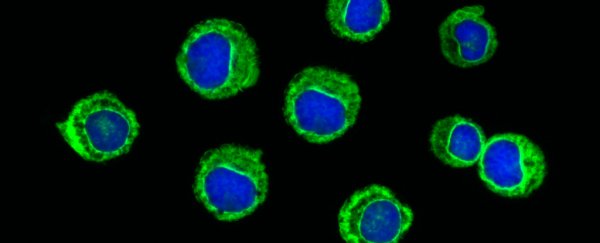Researchers in the US have found an antibody that turns cancerous leukaemia cells into natural killer cells - a type of white blood cell that's able to seek out and destroy tumour cells in the body. If it works in humans, it would not only reduce the number of cancer cells in a patient, but could get rid of them altogether.
So far trials in the lab have shown that the converted human leukaemia cells were able to wipe out nearly 15 percent of the cancerous leukaemia cells in just 24 hours. "It's a totally new approach to cancer, and we're working to test it in human patients as soon as possible," said lead researcher Richard A. Lerner from the Scripps Research Institute in Los Angeles.
The results are so promising, even Lerner was surprised by how things turned out. His team had recently discovered that by exposing marrow cells to antibodies from other parts of the body, they could change the fate of the cells entirely. The bone marrow cells could be turned into brain cells, for example.
Based on this knowledge, Learner and his colleagues started looking for an antibody that could transform cancerous leukaemia cells back into healthy bone marrow cells. But instead they stumbled across a rare human antibody that has even more potential: it can actually turn leukaemia cells into cancer killers.
The antibody in question binds to a receptor called TPO - or thrombopoietin - which is found on most acute myeloid leukaemia cells. When the researchers first exposed the leukaema cells to the antibody, they watched as it turned many of them into harmless immune cells known as dendritic cells.
That in itself was an awesome discovery, but they showed that when they continued to apply the antibody to the cells, a number of them developed further into cells very similar to natural killer (NK) cells, which are kind of like the pitbulls of the immune system.
Amazingly, these newly transformed NK cells started quickly wiping out the remaining leukaemia cells around them. Within one day, a "modest number" of these new NK cells had killed 15 percent of the surrounding leukaemia.
"That antibody could have turned those acute myeloid leukaemia cells into a lot of other cell types, but somehow we were lucky enough to get NK cells," said Lerner.
Fortunately, the antibody only affected leukaemia cells, and not healthy bone marrow, which suggests that it could work as a targeted cancer therapy. And for some reason, the NK cells also didn't seem to attack all cancer types - only their former brethren.
That's both good and bad, as it means they're more specific and are less likely to have side effects. But it also means that when tested against breast cancer, the NK cells weren't useful.
Further testing will assess the safety and effectiveness of the potential treatment, and Lerner's team is now trying to figure out exactly how the antibody works. But they're pretty keen to get the therapy into clinical trials soon.
"We're in discussions with pharmaceutical companies to take this straight into humans after the appropriate preclinical toxicity studies," said Lerner.
The team is also screening for antibodies that could have a similar effect on other cancer types. The new approach is incredibly exciting, and we really hope it lives up to its potential.
The research has been published in PNAS.
